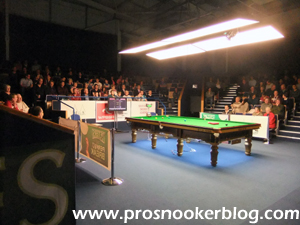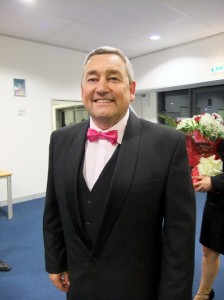 The conclusion of this year’s World Championship will mark not only the end of another long season, but also the end of an era in snooker as On Q Promotions will cease to act as a snooker management company.
The conclusion of this year’s World Championship will mark not only the end of another long season, but also the end of an era in snooker as On Q Promotions will cease to act as a snooker management company.
With founder Paul Mount, his daughter Sarah and the rest of the team at the South West Snooker Academy in Gloucester having helped me a great deal and more importantly, having played a real part in the sport over the past six years, I could not let their exit go unnoticed and so I caught up with Paul to look back at their time involved with snooker…
PSB: Hi Paul. Some six years on from entering the world of snooker management back in 2009, in December 2014 it was announced that On Q Promotions will no longer trade as a snooker management company after this season. How easy was it for you to reach that decision?
Paul Mount: It was an easy decision in one way and a difficult decision in another way.
The decision made with the “head” was the easy one because there comes a point when I had to look at On Q purely as a business and make decisions based on the performance of the company.
Financially On Q has been a bit of a disaster, although when considering snooker achievements I would say we have had many successes.
I originally “fell” into player management when snooker was doing well and inward investment to snooker, particularly snooker players sponsorship, was buoyant, but there were players out there looking for help. I wanted to bring sponsorship, improved practice facilities, high quality coaching and opportunities to improve to players outside the top 16, which was why most of the On Q players were initially lower ranked players, although most of them are much higher now.
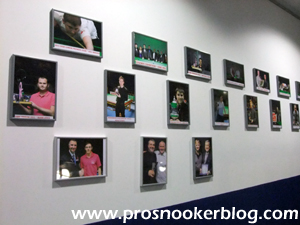
In short I didn’t want to buy my way into the top 16 but instead I had a vision to identify players with potential and help those players reach it.
The decision with the heart was much more difficult because I have had a great time and made some fantastic friends that I will miss.
In fact the business decision was looking more likely at the end of last season but I decided to put it off to honour the contracts On Q had with the players, which all end in May 2015, so that their support network was not removed without time for them to make alternative arrangements.
PSB: It has been quite a journey for everyone involved, not least yourself. What have been the highlights for you?
PM: Wow, so many, on so many different levels.
Being with Robert Milkins when he won the Pro Challenge event in Leicester was an early success and high point. Being with Michael Wasley in the booth at the EIS when he won through Q School to make it as a professional. I bought the balls from that match and Michael writes his “first time” achievements on each of them such as first pro match won, first second round match won etc.
Being in Hainan when Mark Allen won his first ranking event, which was also On Q’s first, was very special, as was being with Barry Hawkins when he won his tense semi-final at the 2013 World Championship against Ricky Walden. He played so well against Ronnie O’Sullivan in the final and afterwards we partied with his and my family until stupid o’clock.
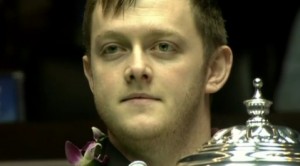
Sharing all of the emotions with Terry Griffiths has been special and he has been a great asset to On Q players and a fantastic confidant and friend to me.
In fact watching all the players grow and progress has been one massive highlight.
PSB: There are a couple of players who have been there right since the beginning, firstly Michael Wasley who last season said that in many ways you have been like a dad to him. How proud are you of what he has achieved so far in the game and of course that win against Ding Junhui at the Crucible?
PM: Michael has done extremely well and there is much more to come. He missed out on tour when he was 19, losing on the black to Luca Brecel in the European Under 19’s final in St Petersburg, and that week really cemented our relationship.
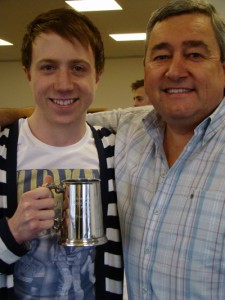
I was really touched when he said I had been like a dad to him because we do have an almost father and son relationship. I couldn’t be any more proud of him if he was my own son.
His win against Ding was the first and probably last time I had ever shouted out in a venue. Fortunately, as usual, I was in a fairly obscure position so no one would have picked it up. I gathered all his family together in his dressing room after the match and he got a big surprise after all the press work.
PSB: Another of course is Robert Milkins, who I think I am right in saying was the first to wear the pink waistcoat and shirt, back at the Grand Prix in 2009 and has risen up the rankings significantly since working with you.
PM: Funnily enough both Robert and Michael wore pink waistcoats, shirts and bow ties at the 2009 Grand Prix but Michael was there purely as a spectator and supporter.
We had the waistcoats made by Vivian, a friend in Gloucester, and went shopping for all the clothing the week before the Grand Prix. The response in Glasgow to the launch of the “Pink Army” was incredible from supporters, commentators and the press. It got our fund-raising for breast cancer charities started which has been continued by On Q and SWSA ever since.
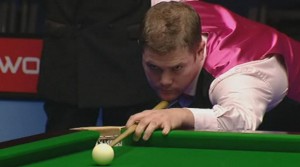
Robert was provisionally 55 in the world rankings when he first approached me, having several personal difficulties which he emotionally talked about to the press during the 2013 World Championship. He made some significant decisions to change things for the better and together we took steps to turn his snooker and private life around.
Our original goal was to get him into the top 32 but as history has witnessed he has done significantly better than that and is now in the top 16, has a stable family life and remains one of the most genuine players on the tour.
PSB: And we cannot fail to mention Barry Hawkins, who of course was the first On Q player to reach the World Championship final back in 2013 and who has really flourished during the past few seasons…
PM: Barry has given me some fantastic memories including winning the Shoot Out in Blackpool, Players Championship Grand Finals in Preston, a fantastic World Championship in 2013 and of course I will never forget his magic stag weekend and wedding to the beautiful Tara. He’s a top bloke on and off the table.
He was just outside the top 16 when I signed him but is now well entrenched in the top 8 and has won events and gone deep in many events. I hope he lifts the World Championship trophy. He’s certainly good enough.
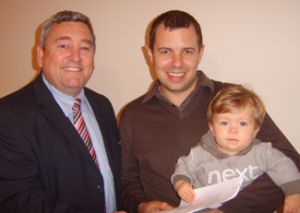
Of course we can’t forget Joe Perry and Mark Davis. Joe has had his best ever season in 2014/15, climbed to his career high ranking of number 9, won two Asian Tour events and the Players Championship, his first full ranking event. Like Barry, Joe is capable of winning the World Championship and again I hope he does.
Mark Davis has been in and around the top 16 for the past few seasons and has won the 6 Red World Championship three times. Let’s hope he gets his hands on the 15 reds equivalent.
PSB: I know that for you it was always important to you that through On Q Promotions you were able to not just help those players at the top of the game, but those who for whatever reason had not yet been able to fulfil their potential, or were promising young players. Are you happy that you have been able to do that?
PM: I’m happy that we have made a start with many of the lower ranked, young players and even some mid ranked players that had not converted their ability into success, but the journey for some of them is still some way off being complete and I hope they will continue to blossom.
I’m happy with the young players we have helped win a tour place but at the same time can’t help feeling sorry for all the players, without support, that never realise their potential purely because they can’t afford it.
The biggest successes from the fairly large amount of youngsters we have worked with are Kyren Wilson, Jamie Jones, Michael White, Michael Wasley, Sam Baird, Liam Highfield and Xiao Guodong.

Our “Golden Oldies” major successes are Mark Davis, Joe Perry, Robert Milkins, Dominic Dale and Barry Hawkins. Mark Allen was the only player who was in the top 16 when we signed him, but he was yet to break through and get to a ranking final and we felt we could help him progress and win titles, which he did.
All other players were outside the top 16 when we signed them and when you consider we had five players in the top 16 at one point, they did pretty well!
PSB: One man who of course you did not manage as a player, but who has contributed a lot to On Q is Terry Griffiths. What has he been like to work with?
PM: Terry is the funniest person I know and a pleasure to work with. He is generous with his praise and sharing his knowledge and I feel I have learnt so much from him about many more things than snooker.
The effect he has on players can be miraculous without ever being dominant. It’s a skill that very few people have and one that only those that have been part of what he does can fully appreciate.
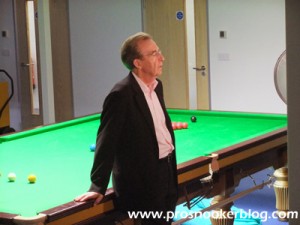
Terry will continue coaching and mentoring players of all abilities but now he is a free agent and not shackled to only working with On Q players exclusively, so I will be interested to see which players take advantage of his availability or more to the point which ones he chooses to work with.
I wish Terry all the success in the world and recommend any player wishing to back themselves to invest a few quid and enjoy the ride.
PSB: Of course, there have been lows as well as highs, for example in 2012 you took the decision not to stage further professional events at the South West Snooker Academy, which for me was a real shame given the facility that you had been able to put in place. Looking back, would you have done anything differently?
PM: No I wouldn’t do anything different because I believe that what I did was right and could have made such a big difference if “snooker” had embraced it.
I spent much more than I should have to show the world what can be achieved when you build a permanent building specifically designed for tournament snooker.
- The foundations and flooring was specially built to give enduring stability and having the tables permanently in the same positions certainly enabled consistent level playing surfaces.
- The air conditioning kept playing temperatures stable.
- Fresh air/ heat exchange units balance the inside air to the outside air to enable clean air to breathe without pumping different temperature air into the playing areas.
- Dehumidifying units to take away all the moisture created by players and spectators etc keeping the humidity well below 50%,
2 – 4 above, which together cost over £180,000, enabled us to vary playing conditions at will and this reduced kicks and big bounces as well as kept the cloths in good condition.
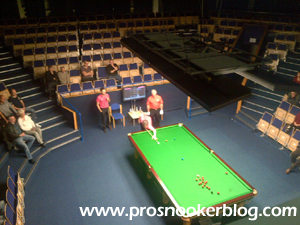
On several occasions, Martin Clark from World Snooker came to me to say there were more kicks than normal in one of the rooms and within 20 minutes our ventilation systems had it under control.
- Permanent Cat 6 networking to all tables and a dedicated server for scoring systems installed in our server room, with a dedicated PC for each table to enable World Snooker et al to simply plug in a laptop to set up their scoring which was virtually trouble free at all events, apart from one incident of human error with the cabling (Not SWSA staff).
- Permanent Cat 6 network cabling and 3 phase power to areas of the building where TV coverage or streaming may be required to enable trouble free video uploads, via our permanent high speed broadband connection, to wherever our clients wanted them sent. Only ever one issue with the streaming when someone turned the power off for the arena which Perform were tapping off for their outside broadcast van (that was me at about midnight during a PTC – egg on face!)
PSB: Looking at the sport generally as someone who has been so heavily involved with players spread across the ranking list, would you say that the game is now in a healthy position?
PM: It depends how you measure healthy. As a business it’s clear that World Snooker is much healthier and making good profits and the players at the very top are much better off financially as there are far more playing opportunities.
The flip side of the business is that the increasing number of mid to lower ranked players are struggling to make any sort of living, for several reasons.
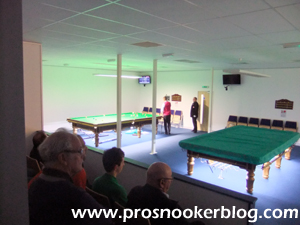 Firstly their expenses have gone up dramatically. Secondly in the higher earning tournaments they are either severely disadvantaged by the seedings (UK championship especially), or need to spend a large part of their first round winnings on entry fees, travelling and local taxes in China and other foreign countries where about 20% is taken at source with no allowance for expenses.
Firstly their expenses have gone up dramatically. Secondly in the higher earning tournaments they are either severely disadvantaged by the seedings (UK championship especially), or need to spend a large part of their first round winnings on entry fees, travelling and local taxes in China and other foreign countries where about 20% is taken at source with no allowance for expenses.
Thirdly, the time it takes for prize monies to be paid is scandalous. All of the players who are out of the World Championship will not have a pay day until August, apart from a couple of European Tour events in July and August, and history tells us they don’t make much in them.
Fourthly, they are being asked to enter and pay entry fees and expenses way before the tournaments. With events in China for instance, the gap between paying entries and receiving prize money is over five months.
In short, without any financial support or sponsorship, which has become far more difficult to acquire, it’s difficult financially for these guys to stay on tour.
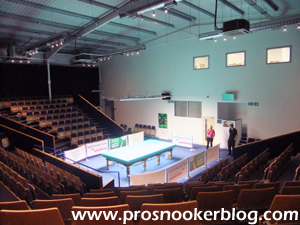 On the subject of sponsorship there are several big issues. Most companies will not get involved because of the emphasis on betting companies. It just doesn’t do their company profile any favours.
On the subject of sponsorship there are several big issues. Most companies will not get involved because of the emphasis on betting companies. It just doesn’t do their company profile any favours.
This is not such a major issue for World Snooker because they receive the sponsorship from the gambling companies and the TV revenue. They can decide how much is used in the prize pot or added to their bottom line, but it is an issue for the players.
You only have to look at how few players have logos, or more to the point how many do not. In 2010, top 32 players could attract an annual sponsor to pay £10,000 – £32,000 – just for wearing their logo – and top 16 players were well above that.
There is not much of that around now and when a sponsor does get involved, such as Kreativ Dental, they can then be enticed into World Snooker sponsorship, for probably not that much more than they were playing their chosen array of players, and have their logo on all players and have banners on TV. The money they spent on individual players goes into World Snooker’s pot to be spent at World Snooker’s discretion. They then show a strong profit and loss for the last financial year and good dividends of over £120,000 for several in World Snooker, including the Commercial Director who is responsible for striking the sponsorship deals. Those players lose out.
[EDIT: Note that since the publication of this interview I have been informed that not all directors receive dividends and that specifically it is not the case that the Commercial Director has received such a dividend as stated]
Prize money has increased but if you take away the very large prizes for the winner and runner up, as well as the events that where already around (e.g. Championship League), the amount available to those players that compete but are not yet appearing in the latter stages of tournaments has not changed in line with expenses.
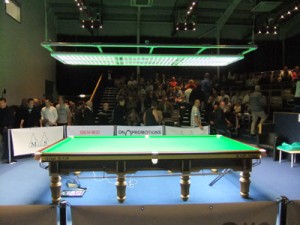 A positive is that spectators now have much more opportunities to watch live snooker, either at venues or on TV, so that is a bonus. My main concern is that the emphasis on money is maybe taking some of the soul out of the game and there are some sacrifices on quality to enable the quantity.
A positive is that spectators now have much more opportunities to watch live snooker, either at venues or on TV, so that is a bonus. My main concern is that the emphasis on money is maybe taking some of the soul out of the game and there are some sacrifices on quality to enable the quantity.
There is obviously a new generation of snooker fans, which is good, that are looking for more than traditional professional snooker events and there are now a variety of formats which address that.
Maybe these new formats will attract more and more fans who also want to play the sport, in the same way 20/20 cricket has revitalised cricket in general.
The warning is that first class county cricket matches are attracting fewer fans which could have a long term effect on England’s International prospects and the future of test cricket.
This is only a problem for the purists and maybe pandering to the new audience is the best way forward. Time will tell for snooker and cricket.
PSB: It is no secret that life on tour can be tough financially for all but those at the top of the world rankings, do you think that more should be done to help support those who are struggling in this respect?
PM: Yes. It’s all about fairness in my mind, or lack of it, and World Snooker and the WPBSA investing in the future, as is done to some extent in China and Thailand where they are financing WPBSA academies.
I know there is a view not to pay losers but if a player has qualified for the tour, there are ways of introducing a “minimum wage” approach so that basic expenses are covered.
For instance the WPBSA has a bank balance that is increasing, year on year, by around £300,000 (currently standing at over £1.3m), which is not that dissimilar to the levy paid by the players on every amount of prize money they win.
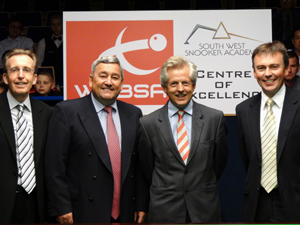
As an association for the members, why not scrap the levy and give their members a fair share in the retained profits to give them breathing space? A large amount of “profit” in the game is going in dividends (£120,000 each) to directors, who are already on good salaries, probably in recognition of how they have helped grow the sport. What about the contributions that the players, at all levels, make to growing the sport. They should use some of the large profits to help the players.
In the six years that I have been involved with snooker, I have never taken a penny out of the sport; no salary, payment of any description or expenses. I’ve covered all of my own costs to travel etc.
My interest has purely been to make a positive contribution to snooker and having no financial rewards has, I believe, enabled me to look at all things from a clear and unique perspective with no hidden agenda or self interest getting in the way of my thoughts and decisions.
PSB: Although On Q Promotions will no longer be involved with managing players beyond this season, you will still be involved with snooker, with the South West Snooker Academy remaining at the Capital Venue. What other plans do you have going forward, at both junior and amateur level?
PM: First and foremost, we will be keeping the long standing events such as the Pink Ribbon tournament and The MIUS Cup (European under 18’s).
Andrew Norman is now managing both the Capital Venue and SWSA and we have developed (the royal “we”) a number of new events, over the past season, which will be built upon in the years to come.

We have concentrated on events to promote amateur participation. We have also created “series” of events so that players can dip in and out of any particular series in the season depending on whether they just want to play in an odd event or look to qualify for the series finals weekend at the end of the season.
The finals for this current season are on 6th May (Pro am series) and 16th May (juniors series). Examples of events include a junior series of events, mid week pro ams and weekend handicap.
Coaching will obviously continue and our Saturday kids club remains popular. Although we haven’t found the next world champion yet, there are some very promising youngsters in the pipeline.
Thanks to Paul for taking the time out to talk about both his time in snooker and some of the issues that he sees going forwards. I am sure that I am not alone in hoping that we will continue to see both him and Sarah at snooker events in the future from time to time.
